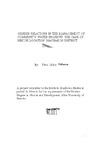| dc.description.abstract | TIlls study discusses the gender relations in the management of
community water projects in Mbiuni Location ofMachakos District.
The main objective of the study is to explore the various socio- cultural
factors that influence participation and decision- making of both men and
women in water projects management.
The study was guided by the social relations approach that
recommends social analysis of different institutions in order to
understand how these social differences and irregularities in roles,
responsibilities, claims and power are reproduced and reinforced by the
same institutions.
A total of III projects participants were randomly sampled and
interviewed using structured questionnaire. Further, 10 key informants
were interviewed using unstructured questionnaire.
The analysis showed that the management of water projects in
Mbiuni Location of Machakos District is not given a gendered approach
f due to rigid cultural practises that leads to Male dominance in the water
management committee. This has constantly continued to undermine the
women's ability to access, use and participate effectively in the
management of water resources.
It is then recommended in this study that, there is need for the
policy makers to mainstream: I:' gender in all stages of water project
management. A complete re-thinking of the underlying social structures
especially those, which discriminate against women at both the family
and community levels, needs to be done. | en |

